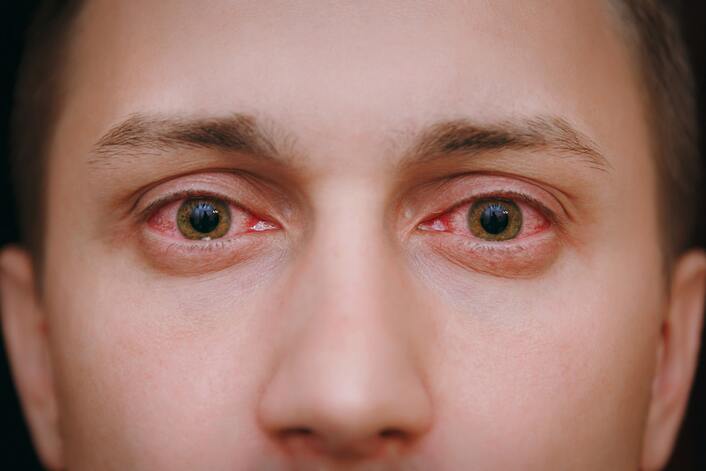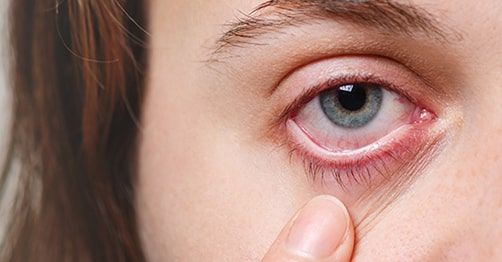pink eye
Improve pink eye symptoms with expert medical care
Imagine you wake up in the morning feeling itchy and burning in your eyes and wondering if you have an eye infection or if it is pink eye.
Pink eye can drastically hinder daily life by affecting regular activities, job performance, and social interactions. In fact, getting ready in the morning is a struggle because of the constant urge to rub the eyes, and bright sunlight makes it worse.
Fret not! Healthcare professionals at Family Urgent Care can help you identify the cause of conjunctivitis and suggest a treatment, whether it is viral, bacterial or caused due to an allergy.
You can visit Family Urgent Care, where our healthcare professionals will provide a comprehensive examination and suggest the appropriate medicine for you.
What is Pink Eye or Conjunctivitis?
Conjunctivitis commonly known as Pink eye is an inflammation of the conjunctiva which is the thin clear tissue that lies over the white part of the eye and lines the inside of the eyelid. This disease is common in children and is rarely serious. However, it is highly contagious, and if treated at the right time and prevented before spreading it has no long-term problems.
How To Know That You That You Have Pink Eye?
The most common symptoms of pink eye are:
- Itchy, irritation or burning in the eyes
- Blurred vision
- Redness in one or both eye
- Being extra sensitive to light
- Yellow, white, or green discharge from the eye
- Gritty feeling in one or both eyes

Is Pink Eye Contagious?
Yes, pink eye or conjunctivitis is contagious whether it’s caused by a virus or bacteria. So, it is very important to be careful, as this disease can spread through physical contact, exhaled droplets, and sharing mutual belongings.
What Are The Causes Of Pink Eye?
Pink eye has various causes, such as bacteria, viruses, chemicals, and allergies.
- Bacteria: Bacteria can be transmitted to both eyes for a variety of reasons, such as physical touch, substandard hygiene, contaminated hand-to-eye contact, and using unhygienic cosmetic brushes.
- Viruses: Pink eye is commonly caused by adenovirus and rarely caused by herpes simplex virus and varicella zoster virus.
- Chemicals: Chemicals inside fumes, smoke and swimming pools can also cause mild to severe pink eye in many people.
- Allergens: Eyes can have negative reactions to allergens such as pollen, mould, and cosmetics.
What Should You Do If You Have Pink Eye?
If you have pink eye in one or both eyes, you need to take some precautions to improve your symptoms and also help limit the spread:
- Wash your hands properly with soap before touching your eye or using any eye drops or ointments.
- Avoid rubbing your eyes as it can worsen your symptoms or spread to other eye.
- Wash any discharge from your eyes with water instead of rubbing your eyes.
- Do not wear contact lenses until your doctor tells you to.
- Try not to share your personal items such as towels, clothes, pillows, and make-up brushes with anyone if you have pink eye.
- Use eye drops or any other medicines on time as recommended by your provider.
When Should I Call the Doctor?
In some cases, pink eye can go away without a doctor, but you need to see a provider for certain conditions. It is important to see a doctor if you are suffering from a condition like
- HIV
- Cancer
- Pregnancy
- Recent Eye Injury or Surgery
- Weakened Immune System
- High Fever
If your symptoms are not getting better and if you do not see any improvement in the next 24 to 48 hours, then it is recommended to see a health care professional.
How Can You Prevent Pink Eye From Spreading?
You can prevent pink eyes by following these steps:
- Wash your hands properly as the germs can enter your eye if you touch your face or eye.
- Do not share personal items like clothes, eyeglasses, towels, and pillows with an infected person.
- Avoid touching your face or rubbing your eyes.
- Avoid touching people who are infected.
What Can You Expect When You Visit Family Urgent Care For Pink Eye?
Once you visit our clinic in Illinois or Indiana, our health providers will diagnose the type of pink eye based on your symptoms, perform an eye exam and suggest an appropriate treatment for you.
If pink eye is caused by bacteria, your provider will prescribe antibiotic eyedrops, ointments or pills. However, if it’s caused by a virus, then the symptoms might settle on their own unless it’s caused by herpes simplex, varicella-zoster virus or STI.
Not to mention, our providers will address your concerns or queries regarding preventing and managing pink eye and also counsel you on how you can prevent spreading pink eye.
Don’t let pink eye cloud your vision anymore! You can consult our providers by booking an appointment or even walking in directly.
Related Services

Hand foot & mouth

wellness physicals


